UTC 8.18.21 FY22 Proposed Transportation Budget — original pdf
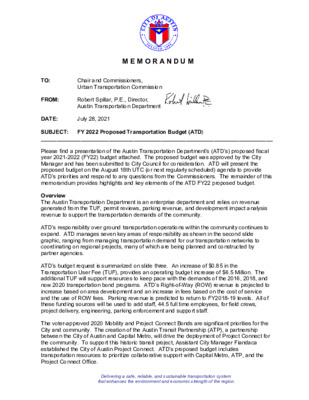
Backup

Backup
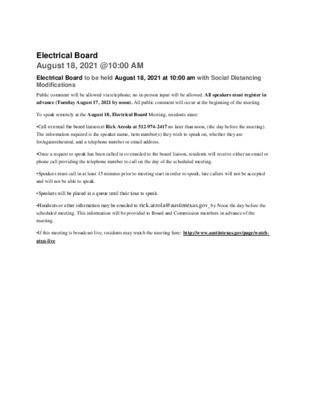
Electrical Board August 18, 2021 @10:00 AM Electrical Board to be held August 18, 2021 at 10:00 am with Social Distancing Modifications Public comment will be allowed via telephone; no in-person input will be allowed. All speakers must register in advance (Tuesday August 17, 2021 by noon). All public comment will occur at the beginning of the meeting. To speak remotely at the August 18, Electrical Board Meeting, residents must: •Call or email the board liaison at Rick Arzola at 512-974-2417 no later than noon, (the day before the meeting). The information required is the speaker name, item number(s) they wish to speak on, whether they are for/against/neutral, and a telephone number or email address. •Once a request to speak has been called in or emailed to the board liaison, residents will receive either an email or phone call providing the telephone number to call on the day of the scheduled meeting. •Speakers must call in at least 15 minutes prior to meeting start in order to speak, late callers will not be accepted and will not be able to speak. •Speakers will be placed in a queue until their time to speak. •Handouts or other information may be emailed to rick.arzola@austintexas.gov by Noon the day before the scheduled meeting. This information will be provided to Board and Commission members in advance of the meeting. •If this meeting is broadcast live, residents may watch the meeting here: http://www.austintexas.gov/page/watch- atxn-live Tabla eléctrica 18 de agosto de 2021 a las 10:00 a.m. El tablero eléctrico se llevará a cabo el 18 de agosto de 2021 a las 10:00 a.m. con modificaciones de distanciamiento social Se permitirán comentarios públicos por teléfono; no se permitirá ninguna entrada en persona. Todos los ponentes deben registrarse con anticipación (martes 17de agosto de 2021 antes del mediodía). Todos los comentarios públicos se producirán al comienzo de la reunión. Para hablar de forma remota en la reunión de la Junta Eléctrica del 18 de agosto los residentes deben: • Llame o envíe un correo electrónico al enlace de la junta en Rick Arzola al 512-974-2417 a más tardar al mediodía (el día antes de la reunión). La información requerida es el nombre del orador, los números de artículo sobre los que desean hablar, si están a favor / en contra / neutrales, y un número de teléfono o dirección de correo electrónico. Una vez que se haya llamado …
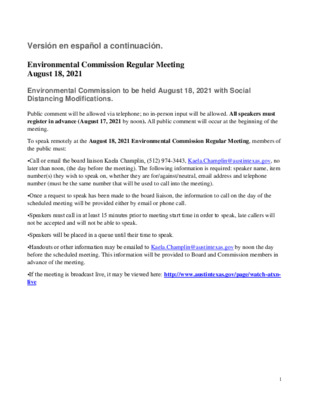
Versión en español a continuación. Environmental Commission Regular Meeting August 18, 2021 Environmental Commission to be held August 18, 2021 with Social Distancing Modifications. Public comment will be allowed via telephone; no in-person input will be allowed. All speakers must register in advance (August 17, 2021 by noon). All public comment will occur at the beginning of the meeting. To speak remotely at the August 18, 2021 Environmental Commission Regular Meeting, members of the public must: •Call or email the board liaison Kaela Champlin, (512) 974-3443, Kaela.Champlin@austintexas.gov, no later than noon, (the day before the meeting). The following information is required: speaker name, item number(s) they wish to speak on, whether they are for/against/neutral, email address and telephone number (must be the same number that will be used to call into the meeting). •Once a request to speak has been made to the board liaison, the information to call on the day of the scheduled meeting will be provided either by email or phone call. •Speakers must call in at least 15 minutes prior to meeting start time in order to speak, late callers will not be accepted and will not be able to speak. •Speakers will be placed in a queue until their time to speak. •Handouts or other information may be emailed to Kaela.Champlin@austintexas.gov by noon the day before the scheduled meeting. This information will be provided to Board and Commission members in advance of the meeting. •If the meeting is broadcast live, it may be viewed here: http://www.austintexas.gov/page/watch-atxn- live 1 Reunión del Environmental Commission FECHA de la reunion (18 de agosto de 2021) La junta se llevará con modificaciones de distanciamiento social Se permitirán comentarios públicos por teléfono; no se permitirá ninguna entrada en persona. Todos los oradores deben registrarse con anticipación (17 de agosto de 2021 antes del mediodía). Todos los comentarios públicos se producirán al comienzo de la reunión. Para hablar de forma remota en la reunión, los miembros del público deben: • Llame o envíe un correo electrónico al enlace de la junta en Kaela Champlin, (512) 974-3443, Kaela.Champlin@austintexas.gov a más tardar al mediodía (el día antes de la reunión). Se requiere la siguiente información: nombre del orador, número (s) de artículo sobre el que desean hablar, si están a favor / en contra / neutral, dirección de correo electrónico (opcional) y un número de teléfono (debe ser el número que se utilizará para …
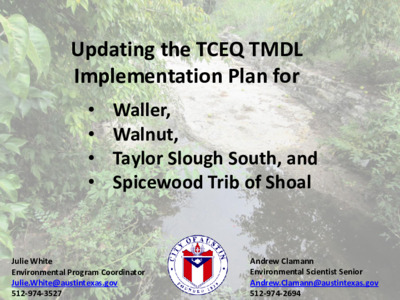
Updating the TCEQ TMDL Implementation Plan for • Waller, • Walnut, • Taylor Slough South, and • Spicewood Trib of Shoal Julie White Environmental Program Coordinator Julie.White@austintexas.gov 512-974-3527 Andrew Clamann Environmental Scientist Senior Andrew.Clamann@austintexas.gov 512-974-2694 This is not my beautiful creek! You may ask yourself: How did we get here? Water quality monitoring data submitted to the State If data indicates impairment, then the stream is placed on the "303(d)* list" * Clean Water Act Section 303(d) requires states to regularly identify water bodies that do not meet water quality standards ** TMDL (Total Maximum Daily Load): a program to analyze data with goal to resolve issue State develops a TMDL** with an Implementation Plan aka "IPlan" You may ask yourself: My God, what's an IPLAN? • A set of strategies to achieve the goal of pollution reduction outlined in the TMDL • Facilitated by TCEQ staff • Developed by stakeholders • 5year implementation period (+ revisions) An I-plan outlines: • What the community will do over the next five years • Who will do it • When they will do it • How we will gauge improvement Currently there are 5 Austin watersheds with IPlans (due to bacteria impairment) IPlan approved in 2011, revised 2017 Gilleland Waller Walnut Taylor Slough South Spicewood Trib of Shoal IPlan for 4 urban watersheds approved in 2015, expired* in 2020, now require revision *IPlans have 5-year approval periods after which they are reviewed and revised (if necessary) The 2015-2020 IPlan for 4 Austin urban creeks 5 primary voluntary strategies • Protect and restore riparian areas • Maintain wastewater infrastructure – includes OSSF, adding public toilets • Improve domestic pet waste management • Education/ public outreach to engage citizens • Improve management of stormwater MS4 Permit & Stormwater Management Program (SWMP) • Population triggered regulatory permit designed to reduce pollutant discharges into city stormwater conveyances. • Develop and implement a plan and submit accomplishments to the TCEQ annually • Periodic audits by TCEQ or EPA Measures to reduce stormwater pollution aka Minimum Control Measures (MCMs) 1. MS4 Maintenance Activities 2. Post-Construction Storm Water Control Measures 3. Illicit Discharge Detection and Elimination 4. Pollution Prevention/Good Housekeeping for Municipal Operations 5. Industrial and High Risk Runoff 6. Construction Site Storm Water Runoff 7. Public Education and Involvement 8. Monitoring Programs I thought we were talking about I-plans? TMDL measures (previously voluntary) are now required to be …
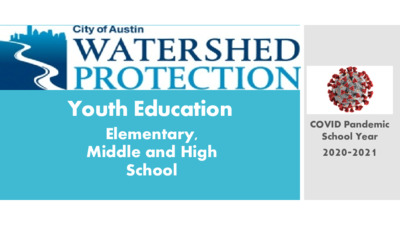
Youth Education Elementary, Middle and High School COVID Pandemic School Year 2020-2021 Education Programs Covid-19 Response Teachers pivoted to a VIRTUAL FORMAT: teaching to a camera, interacting with students as a host via Zoom and performing the role of videographer. Equipment identified and acquired to teach virtually in the field. Two more Teaching Videos produced to add to the ten videos produces in April/May 2020. All videos uploaded to the City of Austin YouTube Channel. Lessons were recreated and rewritten for a VIRTUAL LIVE presentation. Kahoot games created for lessons. Fun timers and Wheel of Names for prizes to promote student participation. Hands-on materials for LIVE interactions delivered to schools. . Fifth grade Virtual Earth Camp 1047 students from 19 schools • • LIVE Zoomed from the Field Interactive Lessons Students made paper watersheds Student Ethnicity Mapped their school’s watershed Used a hairnet to simulate a helmet to enter a cave of the aquifer virtually Mixed Ethnicity/Other 2% White 7% Asian/Pacific Islander 3% Black 9% Hispanic 79% Planted seeds. Fifth grade Virtual Earth School 1463 students from 16 schools Student Ethnicity Hispanic 32% White 52% Mixed Ethnicity/Other 5% Black 3% Asian/Pacific Islander 8% Put photos here LIVE classroom Zoom Interactive Lesson • Paper Watershed Model Activity • Aquifer & Watershed Model Demonstrations • Breakout Room Discussions about Pollution & Solutions • Flood Safety Awareness Presentation Elementary & Middle school Virtual Clean Creek Campus 1,376 students from 14 schools LIVE, in the field and classroom, Zoom Interactive Lessons for CLEAN CREEK CAMPUS Langford 5th grade teacher: “Being able to go on a virtual field trip this year was a real treat for the students. Honestly, it increased participation in zoom classes. The virtual field trip was the highlight for sure! The educators did a really good job answering students' questions on the spot and allowing for a lot of class participation to maintain engagement throughout. It was fantastic!” Middle School Watershed Detectives cancelled due to COVID Partnered with CaveSim to deliver virtual programming to 1008 students 3 middle schools and 3 elementary schools Student Ethnicity Mixed Ethnicity/Other 1% Asian/Pacific Islander 4% Black 6% White 15% Hispanic 74% High School Hydrofiles cancelled due to COVID Participated in Barton Springs University Virtual Presentation – 29 students Partnered with PARD Ranger Cadet Program High school Austin Youth River Watch 49 students Pandemic Adjusted Goals: Virtual Program Delivery Materials Delivered Small Group Virtual …
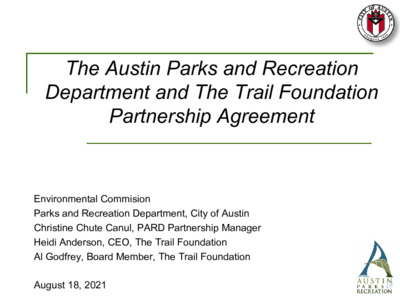
The Austin Parks and Recreation Department and The Trail Foundation Partnership Agreement Environmental Commision Parks and Recreation Department, City of Austin Christine Chute Canul, PARD Partnership Manager Heidi Anderson, CEO, The Trail Foundation Al Godfrey, Board Member, The Trail Foundation August 18, 2021 The Trail Foundation 2 The Trail Foundation (TTF) A 501(c)3 dedicated to protecting, enhancing, and connecting the Butler Hike-and-Bike Trail at Lady Bird Lake for the benefit of all. TTF/City of Austin Partnership Timeline 1971 – Public-private civic effort formed led by the Citizen’s Committee for a More Beautiful Town Lake 2003 – Town Lake Trail Foundation (now The Trail Foundation) was formed to continue the work of the Citizen’s Committee and ensure that the Trail remains one of Austin’s outstanding places 2014 – Boardwalk opens, completes the 10+ mile loop of the Ann and Roy Butler Trail 2015 – TTF adopted the Butler Trail at Lady Bird Lake Urban Forestry and Natural Areas Management Guidelines, developed by Siglo Group in consultation with TTF, Austin Parks and Recreation (PARD) and the City of Austin Watershed Protection Department (WPD). 2018 – PARD and TTF begin discussions to formalize partnership 2020 – Formal process begins to enter into phased Parkland Operations & Maintenance Agreement (POMA) with PARD 3 TTF Investment & Public Benefit Since 2003, TTF has invested more than $17,550,000 on the Butler Trail and the Town Lake Metro Park, including infrastructure projects, ecological restoration, and maintenance. Pre-pandemic (2019) Annual TTF Investment: $3,319,731 Volunteer Impact Since January 2017: 219 Volunteer Events 3,988 Volunteers 15,687 Sapling Trees Planted 1,588 Yards of Mulch/compost Spread 59.4 Acres of Wildflowers Planted ...In addition to an increasingly robust volunteer impact program. Just this year, 400+ bags of trash were collected and 71 screech owl nest boxes were made and installed. 4 Council Resolution - 20200312-041 BE IT RESOLVED BY THE CITY COUNCIL OF THE CITY OF AUSTIN: The City Council expresses support for the concept of parkland agreements between nonprofit organizations and PARD if the agreements further the mission And vision of the department with regard to non- enterprise fund public parks and trails in an effective, efficient, and inclusive manner. BE IT RESOLVED: The City Council directs the City Manager to work with parks nonprofit partners that have established relationships with PARD, including but not limited to The Trail Foundation and …
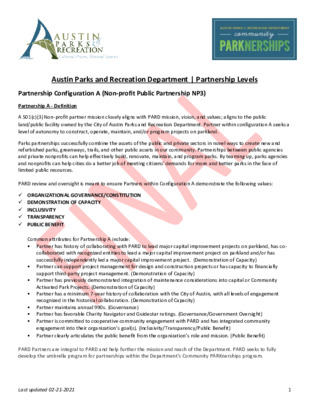
Austin Parks and Recreation Department | Partnership Levels Partnership Configuration A (Non-profit Public Partnership NP3) Partnership A - Definition A 501(c)(3) Non-profit partner mission closely aligns with PARD mission, vision, and values; aligns to the public land/public facility owned by the City of Austin Parks and Recreation Department. Partner within configuration A seeks a level of autonomy to construct, operate, maintain, and/or program projects on parkland. Parks partnerships successfully combine the assets of the public and private sectors in novel ways to create new and refurbished parks, greenways, trails, and other public assets in our community. Partnerships between public agencies and private nonprofits can help effectively build, renovate, maintain, and program parks. By teaming up, parks agencies and nonprofits can help cities do a better job of meeting citizens' demands for more and better parks in the face of limited public resources. PARD review and oversight is meant to ensure Partners within Configuration A demonstrate the following values: ✓ ORGANIZATIONAL GOVERNANCE/CONSTITUTION ✓ DEMONSTRATION OF CAPACITY ✓ INCLUSIVITY ✓ TRANSPARENCY ✓ PUBLIC BENEFIT Common attributes for Partnership A include: • Partner has history of collaborating with PARD to lead major capital improvement projects on parkland, has co- collaborated with recognized entities to lead a major capital improvement project on parkland and/or has successfully independently led a major capital improvement project. (Demonstration of Capacity) • Partner can support project management for design and construction projects or has capacity to financially support third-party project management. (Demonstration of Capacity) • Partner has previously demonstrated integration of maintenance considerations into capital or Community Activated Park Projects. (Demonstration of Capacity) • Partner has a minimum 7-year history of collaboration with the City of Austin, with all levels of engagement recognized in the historical collaboration. (Demonstration of Capacity) • Partner maintains annual 990s. (Governance) • Partner has favorable Charity Navigator and Guidestar ratings. (Governance/Government Oversight) • Partner is committed to cooperative community engagement with PARD and has integrated community engagement into their organization’s goal(s). (Inclusivity/Transparency/Public Benefit) • Partner clearly articulates the public benefit from the organization’s role and mission. (Public Benefit) PARD Partners are integral to PARD and help further the mission and reach of the Department. PARD seeks to fully develop the umbrella program for partnerships within the Department’s Community PARKnerships program. Last updated 02-21-2021 1 Partnership A - Criteria This level of partnership requires a formal partnership review process. The review process will take up …
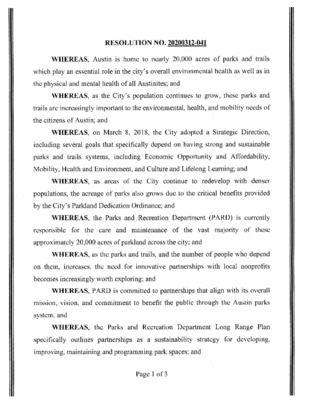
RESOLUTION NO. 20200312-041 WHEREAS, Austin is home to nearly 20,000 acres of parks and trails which play an essential role in the city's overall environmental health as well as in the physical and mental health of all Austinites; and WHEREAS, as the City's population continues to grow, these parks and trails are increasingly important to the environmental, health, and mobility needs of the citizens of Austin; and WHEREAS, on March 8, 2018, the City adopted a Strategic Direction, including several goals that specifically depend on having strong and sustainable including Economic Opportunity and Affordability, parks and trails systems, Mobility, Health and Environment, and Culture and Lifelong Learning; and WHEREAS, as areas of the City continue to redevelop with denser populations, the acreage of parks also grows due to the critical benefits provided by the City' s Parkland Dedication Ordinance; and WHEREAS, the Parks and Recreation Department (PARD) is currently these the vast majority of responsible for approximately 20,000 acres of parkland across the city; and the care and maintenance of WHEREAS, as the parks and trails, and the number of people who depend the need for innovative partnerships with local nonprofits increases, on them, becomes increasingly worth exploring; and WHEREAS, PARD is committed to partnerships that align with its overall mission, vision, and commitment to benefit the public through the Austin parks system; and WHEREAS, the Parks and Recreation Department Long Range Plan specifically outlines partnerships as a sustainability strategy for developing, improving, maintaining and programming park spaces; and Page 1 of 3 WHEREAS, PARD works with nonprofit organizations, conservancies, increase community groups, and businesses to enhance and improve parks, recreational and cultural opportunities, and preserve natural areas in Austin; and WHEREAS, the goals of these partnerships are to enhance and expand public use of PARD's grounds and facilities; encourage active recreation and healthy lifestyles; improve environmental stewardship through public participation and education; celebrate arts, culture, and history to build community; and maximize public benefit at minimum taxpayer cost; and WHEREAS, many peer cities such as Dallas, Houston, Chicago, New York City, and others have negotiated partnerships with nonprofit organizations dedicated to the maintenance and stewardship of particular parks; and WHEREAS, nonprofit organizations dedicated to improving parks and open space for the benefit of the community often have the ability to fundraise and other opportunities that municipalities do not have; and WHEREAS, in Austin, some nonprofits have already begun partnering …
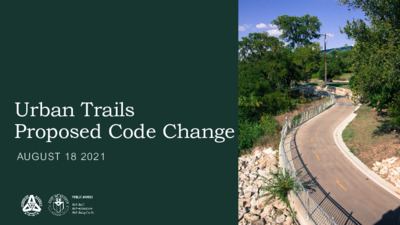
Urban Trails Proposed Code Change AUGUST 18 2021 Agenda 8.18.2021 I. Background #EFA160 #16362F II. Proposed Code Changes LDC 25-8-341/342 I. II. LDC 25-1-261(B)(3)(c) #1886CA III. Q&A PUBLIC WORKS DEPARTMENT – CITY OF AUSTIN 2 Background Resolution NO. 20200220-045 ] PUBLIC WORKS DEPARTMENT – CITY OF AUSTIN 3 Background February 2020 April 2020 • Resolution NO. 20200220-045 Passed • Stakeholder Group Convened January 2021 #EFA160 • Memo response to Resolution June 2021 #16362F • Resolution NO. 20210610-041 Passed Resolution NO. 20210610-041 #1886CA “(2) Council initiates the following amendments to the Land Development Code, as recommended by PWD and WPD in Appendix B of the January 4, 2021 memo from PWD, and asks that they be brought back to Council by August 26, 2021: (a) Amend Land Development Code 25-8-341 and 25-8-342 to grant urban trails projects greater cut and fill allowances under specific environmental circumstances. (b) Amend Land Development Code 25-8-261(B)(3)(c) to reflect current policy that trails within the critical water quality zone be limited to 12 feet in surface width plus one-foot shoulders on each side. PUBLIC WORKS DEPARTMENT – CITY OF AUSTIN 4 PURPOSE • Streamline review process • Create transparency • Formalize internal policy LDC 25-8-341 & 25-8-342: Cut and Fill Current Status: Cut and/or fill in a suburban watershed is limited to 4 ft in depth Administrative variance typically granted to allow up to 8 ft, with certain conditions Construction of roadways in public right-of-way has no cut or fill limit Proposed Improvement #EFA160 #16362F Allow cut and/or fill of up to 8 ft for a public trail if: The cut or fill is not located on a slope of more than 15% The cut or fill is not located within 100 #1886CA ft of a classified waterway; and The trail is constructed in accordance with the Environmental Criteria Manual. PUBLIC WORKS DEPARTMENT – CITY OF AUSTIN 6 NORTHERN WALNUT CREEK TRAIL Northern Walnut Creek Trail Phase 2A • Construction beginning November 2021 • Granted admin variance from cut and fill requirements LDC 25-8-261: Critical Water Quality Zone Development Current Status: A hard surface trail within the critical water quality zone is limited to 12 feet in width, unless a wider trail is designated in a Council adopted plan. Current language does not make clear if the 12 ft refers to the surface width or if it includes …
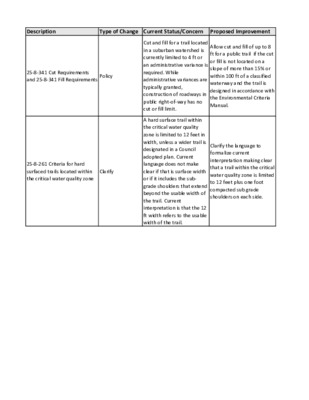
Description Type of Change Current Status/Concern Proposed Improvement 25-8-341 Cut Requirements and 25-8-341 Fill Requirements Policy 25-8-261 Criteria for hard surfaced trails located within the critical water quality zone Clarify Cut and fill for a trail located in a suburban watershed is currently limited to 4 ft or an administrative variance is required. While administrative variances are typically granted, construction of roadways in public right-of-way has no cut or fill limit. A hard surface trail within the critical water quality zone is limited to 12 feet in width, unless a wider trail is designated in a Council adopted plan. Current language does not make clear if that is surface width or if it includes the sub- grade shoulders that extend beyond the usable width of the trail. Current interpretation is that the 12 ft width refers to the usable width of the trail. Allow cut and fill of up to 8 ft for a public trail if the cut or fill is not located on a slope of more than 15% or within 100 ft of a classified waterway and the trail is designed in accordance with the Environmental Criteria Manual. Clarify the language to formalize current interpretation making clear that a trail within the critical water quality zone is limited to 12 feet plus one foot compacted sub grade shoulders on each side. Advantage Disadvantage Streamlines review process. None Formalizes internal policy. None
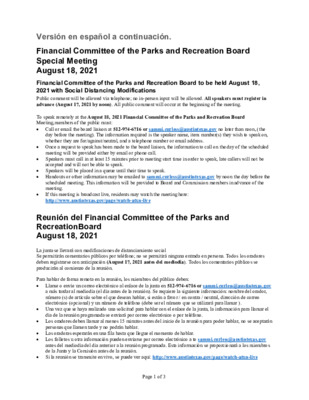
Versión en español a continuación. Financial Committee of the Parks and Recreation Board Special Meeting August 18, 2021 Financial Committee of the Parks and Recreation Board to be held August 18, 2021 with Social Distancing Modifications Public comment will be allowed via telephone; no in-person input will be allowed. All speakers must register in advance (August 17, 2021 by noon). All public comment will occur at the beginning of the meeting. To speak remotely at the August 18, 2021 Financial Committee of the Parks and Recreation Board Meeting, members of the public must: • Call or email the board liaison at 512-974-6716 or sammi.curless@austintexas.gov no later than noon, (the day before the meeting). The information required is the speaker name, item number(s) they wish to speak on, whether they are for/against/neutral, and a telephone number or email address. • Once a request to speak has been made to the board liaison, the information to call on the day of the scheduled meeting will be provided either by email or phone call. • Speakers must call in at least 15 minutes prior to meeting start time in order to speak, late callers will not be accepted and will not be able to speak. • Speakers will be placed in a queue until their time to speak. • Handouts or other information may be emailed to sammi.curless@austintexas.gov by noon the day before the scheduled meeting. This information will be provided to Board and Commission members in advance of the meeting. If this meeting is broadcast live, residents may watch the meeting here: http://www.austintexas.gov/page/watch-atxn-live • Reunión del Financial Committee of the Parks and Recreation Board August 18, 2021 La junta se llevará con modificaciones de distanciamiento social Se permitirán comentarios públicos por teléfono; no se permitirá ninguna entrada en persona. Todos los oradores deben registrarse con anticipación (August 17, 2021 antes del mediodía). Todos los comentarios públicos se producirán al comienzo de la reunión. Para hablar de forma remota en la reunión, los miembros del público deben: • Llame o envíe un correo electrónico al enlace de la junta en 512-974-6716 or sammi.curless@austintexas.gov a más tardar al mediodía (el día antes de la reunión). Se requiere la siguiente información: nombre del orador, número (s) de artículo sobre el que desean hablar, si están a favor / en contra / neutral, dirección de correo electrónico (opcional) y un número de teléfono (debe ser el …
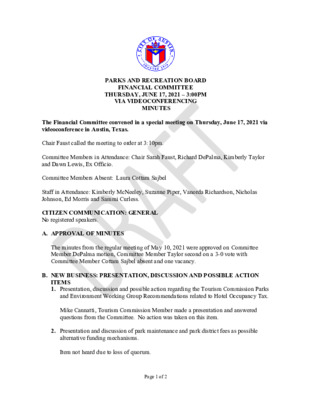
PARKS AND RECREATION BOARD FINANCIAL COMMITTEE THURSDAY, JUNE 17, 2021 – 3:00PM VIA VIDEOCONFERENCING MINUTES The Financial Committee convened in a special meeting on Thursday, June 17, 2021 via videoconference in Austin, Texas. Chair Faust called the meeting to order at 3:10pm. Committee Members in Attendance: Chair Sarah Faust, Richard DePalma, Kimberly Taylor and Dawn Lewis, Ex Officio. Committee Members Absent: Laura Cottam Sajbel Staff in Attendance: Kimberly McNeeley, Suzanne Piper, Vanorda Richardson, Nicholas Johnson, Ed Morris and Sammi Curless. CITIZEN COMMUNICATION: GENERAL No registered speakers. A. APPROVAL OF MINUTES The minutes from the regular meeting of May 10, 2021 were approved on Committee Member DePalma motion, Committee Member Taylor second on a 3-0 vote with Committee Member Cottam Sajbel absent and one vacancy. B. NEW BUSINESS: PRESENTATION, DISCUSSION AND POSSIBLE ACTION ITEMS 1. Presentation, discussion and possible action regarding the Tourism Commission Parks and Environment Working Group Recommendations related to Hotel Occupancy Tax. Mike Cannatti, Tourism Commission Member made a presentation and answered questions from the Committee. No action was taken on this item. 2. Presentation and discussion of park maintenance and park district fees as possible alternative funding mechanisms. Item not heard due to loss of quorum. Page 1 of 2 3. Discussion of Parks and Recreation Department Fiscal Year 2021 revenue activity summary memo. Item not heard due to loss of quorum. Chair Faust adjourned the meeting at 3:58pm due to loss of quorum. Page 2 of 2
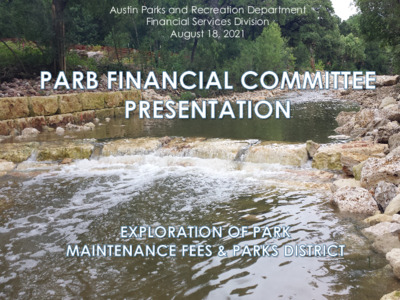
Austin Parks and Recreation Department Financial Services Division August 18, 2021 1 PARK MAINTENANCE FEE The purpose of a park maintenance fee would be to provide for the operation and maintenance of the parks and facilities within the City of Austin Parks & Recreation Department. A parks maintenance fee would be paid by the responsible part for each developed property within the corporate limits of the city. Collection of the fee would be made by a monthly charge included on the City Utility Bill. Fees collected would be deposited into a City special revenue park fee account. *Source Central Point Oregon Parks & Rec Ordinance 2 PARK MAINTENANCE FEE OPTIONS MODELS Option One – Fixed Monthly Fee, similar to the Clean Community Fee Possible charge of $8.95/residents and $20.75/commercial per month Option Two – Dwelling Type Allocation, similar to the Transportation User Fee Possible charge of about $12.79/residents and $63.99/commercial per acre per month 3 CITIES WITH PARK MAINTENANCE FEES Population Served* Number of Homes Monthly Fee Estimated Annual Collection Type Canby, Oregon 18,000 6,600$5 per dwelling $396,000 Central Point, Oregon Longmont, Colorado Rocklin, California San Antonio, Texas 18,000 7,000$3 per dwelling $252,000 95,000 36,800$2 per dwelling $883,200 65,000 23,146$10-30 per dwelling $8,332,560 1,530,000 550,000$1.50 per dwelling $9,900,000 Austin, Texas 950,807 415,000$8.95 per dwelling $44,820,000 Austin, Texas 950,807 415,000$11-13 per dwelling $63,700,000 Monthly Fixed Fee Monthly Fixed Fee Monthly Fixed Fee Based on Dwelling type Monthly Fixed Fee Monthly Fixed Fee Based on Dwelling type 4 PARK DISTRICT A Park District is a form of local special- purpose district for providing public parks and recreation in or near its geographic boundaries. Some park districts also own or maintain related cultural facilities such as monuments, zoos, sports venues, music venues, or museums. The Park District would be separate from the General Fund Park Districts allow taxes to be levied separate from the traditional city property taxes Admission and registration fees would supplement the Park District 5 PARK DISTRICT MODELS Model #1: Independent governance Stand-alone government entity separate from COA Dissolve current structure of board and PARD leadership structure Board of Commissions/Chief Operating Officer/Personnel Board Workforce: District hired vs. COA Park District fee could be used to create expanded programming including concession programming, sponsorship, advertising & promotion programming Model #2: Under City umbrella …
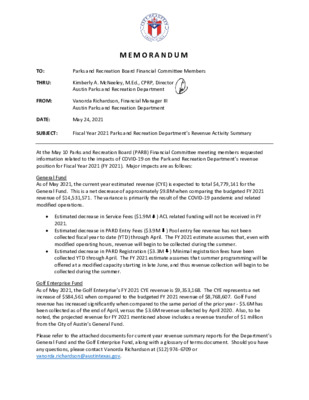
M E M O R A N D U M May 24, 2021 Parks and Recreation Board Financial Committee Members Vanorda Richardson, Financial Manager III Austin Parks and Recreation Department Kimberly A. McNeeley, M.Ed., CPRP, Director Austin Parks and Recreation Department TO: THRU: FROM: DATE: SUBJECT: At the May 10 Parks and Recreation Board (PARB) Financial Committee meeting members requested information related to the impacts of COVID-19 on the Park and Recreation Department’s revenue position for Fiscal Year 2021 (FY 2021). Major impacts are as follows: General Fund As of May 2021, the current year estimated revenue (CYE) is expected to total $4,779,141 for the General Fund. This is a net decrease of approximately $9.8M when comparing the budgeted FY 2021 revenue of $14,531,571. The variance is primarily the result of the COVID-19 pandemic and related modified operations. Fiscal Year 2021 Parks and Recreation Department’s Revenue Activity Summary • Estimated decrease in Service Fees ($1.9M ) ACL related funding will not be received in FY 2021. • Estimated decrease in PARD Entry Fees ($3.9M ) Pool entry fee revenue has not been collected fiscal year to date (YTD) through April. The FY 2021 estimate assumes that, even with modified operating hours, revenue will begin to be collected during the summer. • Estimated decrease in PARD Registration ($3.3M ) Minimal registration fees have been collected YTD through April. The FY 2021 estimate assumes that summer programming will be offered at a modified capacity starting in late June, and thus revenue collection will begin to be collected during the summer. Golf Enterprise Fund As of May 2021, the Golf Enterprise’s FY 2021 CYE revenue is $9,353,168. The CYE represents a net increase of $584,561 when compared to the budgeted FY 2021 revenue of $8,768,607. Golf Fund revenue has increased significantly when compared to the same period of the prior year - $5.6M has been collected as of the end of April, versus the $3.6M revenue collected by April 2020. Also, to be noted, the projected revenue for FY 2021 mentioned above includes a revenue transfer of $1 million from the City of Austin’s General Fund. Please refer to the attached documents for current year revenue summary reports for the Department’s General Fund and the Golf Enterprise Fund, along with a glossary of terms document. Should you have any questions, please contact Vanorda Richardson at (512) 974-6709 or vanorda.richardson@austintexas.gov. Suzanne Piper, DBA, Chief …
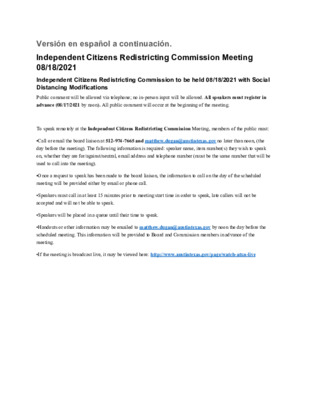
Versión en español a continuación. Independent Citizens Redistricting Commission Meeting 08/18/2021 Independent Citizens Redistricting Commission to be held 08/18/2021 with Social Distancing Modifications Public comment will be allowed via telephone; no in-person input will be allowed. All speakers must register in advance (08/17/2021 by noon). All public comment will occur at the beginning of the meeting. To speak remotely at the Independent Citizens Redistricting Commission Meeting, members of the public must: •Call or email the board liaison at 512-974-7665 and matthew.dugan@austintexas.gov no later than noon, (the day before the meeting). The following information is required: speaker name, item number(s) they wish to speak on, whether they are for/against/neutral, email address and telephone number (must be the same number that will be used to call into the meeting). •Once a request to speak has been made to the board liaison, the information to call on the day of the scheduled meeting will be provided either by email or phone call. •Speakers must call in at least 15 minutes prior to meeting start time in order to speak, late callers will not be accepted and will not be able to speak. •Speakers will be placed in a queue until their time to speak. •Handouts or other information may be emailed to matthew.dugan@austintexas.gov by noon the day before the scheduled meeting. This information will be provided to Board and Commission members in advance of the meeting. •If the meeting is broadcast live, it may be viewed here: http://www.austintexas.gov/page/watch-atxn-live Reunión del Independent Citizens Redistricting Commission FECHA de la reunion (08/18/2021) La junta se llevará con modificaciones de distanciamiento social Se permitirán comentarios públicos por teléfono; no se permitirá ninguna entrada en persona. Todos los oradores deben registrarse con anticipación (08/17/2021 antes del mediodía). Todos los comentarios públicos se producirán al comienzo de la reunión. Para hablar de forma remota en la reunión, los miembros del público deben: • Llame o envíe un correo electrónico al enlace de la junta en 512-974-7665 and matthew.dugan@austintexas.gov a más tardar al mediodía (el día antes de la reunión). Se requiere la siguiente información: nombre del orador, número (s) de artículo sobre el que desean hablar, si están a favor / en contra / neutral, dirección de correo electrónico (opcional) y un número de teléfono (debe ser el número que se utilizará para llamar ). • Una vez que se haya realizado una solicitud para hablar con el enlace …
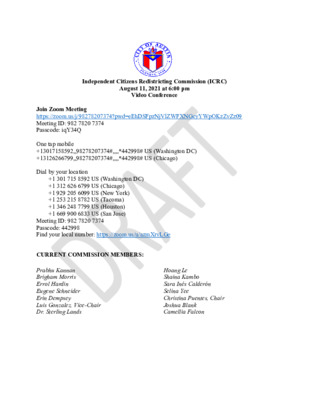
Independent Citizens Redistricting Commission (ICRC) August 11, 2021 at 6:00 pm Video Conference Join Zoom Meeting https://zoom.us/j/98278207374?pwd=eEhDSFpzNjVlZWFXNGcyYWpOKzZvZz09 Meeting ID: 982 7820 7374 Passcode: iqY34Q One tap mobile +13017158592,,98278207374#,,,,*442998# US (Washington DC) +13126266799,,98278207374#,,,,*442998# US (Chicago) Dial by your location +1 301 715 8592 US (Washington DC) +1 312 626 6799 US (Chicago) +1 929 205 6099 US (New York) +1 253 215 8782 US (Tacoma) +1 346 248 7799 US (Houston) +1 669 900 6833 US (San Jose) Meeting ID: 982 7820 7374 Passcode: 442998 Find your local number: https://zoom.us/u/azmXrvLGe CURRENT COMMISSION MEMBERS: Prabhu Kannan Brigham Morris Errol Hardin Eugene Schneider Erin Dempsey Luis Gonzalez, Vice-Chair Dr. Sterling Lands Hoang Le Shaina Kambo Sara Inés Calderón Selina Yee Christina Puentes, Chair Joshua Blank Camellia Falcon Members in Attendance Christina Puentes, Chair Luis Gonzalez, Vice Chair Joshua Blank Erin Dempsey Camellia Falcon Errol Hardin Shaina Kambo Prabhu Kannan Dr. Sterling Lands Hoang Le Brigham Morris Eugene Schneider Selina Yee Staff In Attendance Matthew Dugan, City's Planning Manager George Korbel, Mapping Specialist Christine Granados, ICRC Administrative Manager draft Minutes Meeting Goals: Receive Updates from Working Groups/Subcommittees; Hear Presentation from Austin Independent School District Chair Puentes called the meeting to order at 6:01 p.m. with 10 members present. Commissioner Morris joined the meeting at 6:04 p.m., Commissioner Le joined at 6:14 p.m. and Commissioner Lands joined at 6:33 p.m. CALL TO ORDER CITIZEN COMMUNICATION: GENERAL The first three speakers who register to speak no later than noon the day before the meeting will be allowed a three-minute allotment to address their concerns regarding items not posted on the agenda. Peck Young addressed the ICRC and opted to withhold comment at the public meeting 1. APPROVAL OF MINUTES Discussion and possible action on the Aug. 4, 2021, ICRC meeting minutes. The August 4, 2021, meeting minutes were approved without objection. 2. UNFINISHED BUSINESS The ICRC may discuss and take action on the following agenda items A. Update from Public Forum Working Group on calendar changes Vice Chair Gonzalez gave update about upcoming public forums and new county precinct forums. 3. NEW BUSINESS The ICRC may discuss and take action on the following agenda items A. Presentation from AISD AISD's Jacob Reach, Chief of Government Relations and Board Services; Beth Wilson, Executive Director of Planning and Asset Management, and Geronimo Rodriguez, Board of Trustee President (D6) presented campus and trustee maps and gave a timeline of …
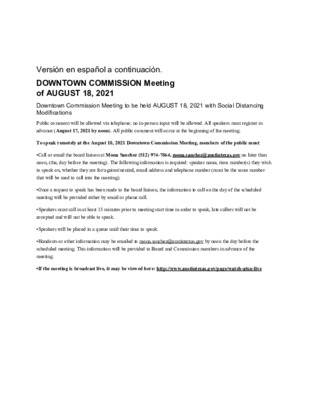
Versión en español a continuación. DOWNTOWN COMMISSION Meeting of AUGUST 18, 2021 Downtown Commission Meeting to be held AUGUST 18, 2021 with Social Distancing Modifications Public comment will be allowed via telephone; no in-person input will be allowed. All speakers must register in advance (August 17, 2021 by noon). All public comment will occur at the beginning of the meeting. To speak remotely at the August 18, 2021 Downtown Commission Meeting, members of the public must: •Call or email the board liaison at Mona Sanchez (512) 974-7864, mona.sanchez@austintexas.gov no later than noon, (the, day before the meeting). The following information is required: speaker name, item number(s) they wish to speak on, whether they are for/against/neutral, email address and telephone number (must be the same number that will be used to call into the meeting). •Once a request to speak has been made to the board liaison, the information to call on the day of the scheduled meeting will be provided either by email or phone call. •Speakers must call in at least 15 minutes prior to meeting start time in order to speak, late callers will not be accepted and will not be able to speak. •Speakers will be placed in a queue until their time to speak. •Handouts or other information may be emailed to mona.sanchez@austintexas.gov by noon the day before the scheduled meeting. This information will be provided to Board and Commission members in advance of the meeting. •If the meeting is broadcast live, it may be viewed here: http://www.austintexas.gov/page/watch-atxn-live Reunión del DOWNTOWN COMMISSION FECHA de la reunion (AUGUST 18, 2021) La junta se llevará con modificaciones de distanciamiento social Se permitirán comentarios públicos por teléfono; no se permitirá ninguna entrada en persona. Todos los oradores deben registrarse con anticipación (August 17, 2021 antes del mediodía). Todos los comentarios públicos se producirán al comienzo de la reunión. Para hablar de forma remota en la reunión, los miembros del público deben: • Llame o envíe un correo electrónico al enlace de la junta en Mona Sanchez, (512) 974-7864, mona.sanchez@austintexas.gov a más tardar al mediodía (el día antes de la reunión). Se requiere la siguiente información: nombre del orador, número (s) de artículo sobre el que desean hablar, si están a favor / en contra / neutral, dirección de correo electrónico (opcional) y un número de teléfono (debe ser el número que se utilizará para llamar ). • Una vez …
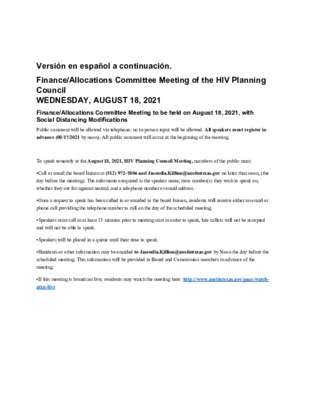
Versión en español a continuación. Finance/Allocations Committee Meeting of the HIV Planning Council WEDNESDAY, AUGUST 18, 2021 Finance/Allocations Committee Meeting to be held on August 18, 2021, with Social Distancing Modifications Public comment will be allowed via telephone; no in-person input will be allowed. All speakers must register in advance (08/17/2021 by noon). All public comment will occur at the beginning of the meeting. To speak remotely at the August 18, 2021, HIV Planning Council Meeting, members of the public must: •Call or email the board liaison at (512) 972-5806 and Jaseudia.Killion@austintexas.gov no later than noon, (the day before the meeting). The information required is the speaker name, item number(s) they wish to speak on, whether they are for/against/neutral, and a telephone number or email address. •Once a request to speak has been called in or emailed to the board liaison, residents will receive either an email or phone call providing the telephone number to call on the day of the scheduled meeting. •Speakers must call in at least 15 minutes prior to meeting start in order to speak, late callers will not be accepted and will not be able to speak. •Speakers will be placed in a queue until their time to speak. •Handouts or other information may be emailed to Jaseudia.Killion@austintexas.gov by Noon the day before the scheduled meeting. This information will be provided to Board and Commission members in advance of the meeting. •If this meeting is broadcast live, residents may watch the meeting here: http://www.austintexas.gov/page/watch- atxn-live la junta en Reunión del Finance/Allocations Meeting of the HIV Planning Council Wednesday, August 18, 2021 FECHA de la reunion (Augusto 18, 2021) La junta se llevará con modificaciones de distanciamiento social Se permitirán comentarios públicos por teléfono; no se permitirá ninguna entrada en persona. Todos los oradores deben registrarse con anticipación (08/17/2021 antes del mediodía). Todos los comentarios públicos se producirán al comienzo de la reunión. Para hablar de forma remota en la reunión, los miembros del público deben: • Llame o envíe un correo electrónico al enlace de (512) 972-5806 and Jaseudia.Killion@austintexas.gov a más tardar al mediodía (el día antes de la reunión). La información requerida es el nombre del orador, los números de artículo sobre los que desean hablar, si están a favor / en contra / neutrales, y un número de teléfono o dirección de correo electrónico. • Una vez que se haya llamado o enviado …
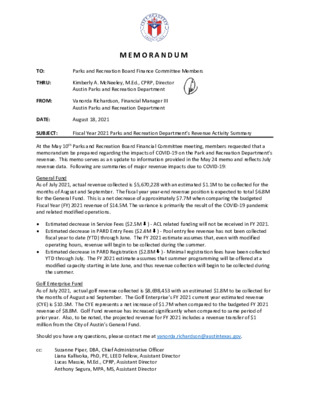
M E M O R A N D U M August 18, 2021 Parks and Recreation Board Finance Committee Members Fiscal Year 2021 Parks and Recreation Department’s Revenue Activity Summary Vanorda Richardson, Financial Manager III Austin Parks and Recreation Department Kimberly A. McNeeley, M.Ed., CPRP, Director Austin Parks and Recreation Department TO: THRU: FROM: DATE: SUBJECT: At the May 10th Parks and Recreation Board Financial Committee meeting, members requested that a memorandum be prepared regarding the impacts of COVID-19 on the Park and Recreation Department’s revenue. This memo serves as an update to information provided in the May 24 memo and reflects July revenue data. Following are summaries of major revenue impacts due to COVID-19: General Fund As of July 2021, actual revenue collected is $5,670,228 with an estimated $1.1M to be collected for the months of August and September. The fiscal year year-end revenue position is expected to total $6.8M for the General Fund. This is a net decrease of approximately $7.7M when comparing the budgeted Fiscal Year (FY) 2021 revenue of $14.5M. The variance is primarily the result of the COVID-19 pandemic and related modified operations. • Estimated decrease in Service Fees ($2.5M • Estimated decrease in PARD Entry Fees ($2.4M ) - ACL related funding will not be received in FY 2021. ) - Pool entry fee revenue has not been collected fiscal year to date (YTD) through June. The FY 2021 estimate assumes that, even with modified operating hours, revenue will begin to be collected during the summer. • Estimated decrease in PARD Registration ($2.8M ) - Minimal registration fees have been collected YTD through July. The FY 2021 estimate assumes that summer programming will be offered at a modified capacity starting in late June, and thus revenue collection will begin to be collected during the summer. Golf Enterprise Fund As of July 2021, actual golf revenue collected is $8,698,453 with an estimated $1.8M to be collected for the months of August and September. The Golf Enterprise’s FY 2021 current year estimated revenue (CYE) is $10.5M. The CYE represents a net increase of $1.7M when compared to the budgeted FY 2021 revenue of $8.8M. Golf Fund revenue has increased significantly when compared to same period of prior year. Also, to be noted, the projected revenue for FY 2021 includes a revenue transfer of $1 million from the City of Austin’s General Fund. Should you have any …
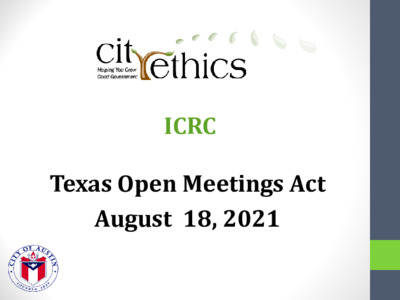
ICRC Texas Open Meetings Act August 18, 2021 • WHAT IT IS: TOMA is a statute (enacted to benefit the public rather than governing bodies) that mandates open public access to all non-excepted meetings • WHERE IT IS: of governmental bodies. Codified in Texas Government Code, Chapter 551. • WHAT IT SAYS: Requires that every meeting of a subject body, with certain narrow enumerated exceptions, be ▪ ▪ ▪ open to the public, and posted as to notice of time, place, and subject matter of items to be discussed, and memorialized with a record. • Open to the Public: Must allow each member of the public who desires to speak to do so during or before consideration of an item May adopt reasonable rules Cannot prohibit public criticism • Meeting Notice (Agenda): Must be posted ▪ ▪ ▪ Minimum of 72 hour notice posted as to notice of time, place, and subject matter of items to be discussed, and memorialized with a record (Standard practice: audio or video recording and minutes reflecting members attendance and action taken). What is a QUORUM? • DEFINITION: TOMA = Allows the City Charter to set the number for a quorum. Charter = For the ICRC, a quorum is 9 members. • POSTING REQUIRED: If a quorum is going to be present at anything other than a purely social or ceremonial function, a meeting notice must be posted. What is a MEETING? • DEFINITION: ▪ “ A verbal exchange among a quorum of the body ... verbal” also means “non-verbal” texts or emails or interactions. … or between a member of the public, or staff, and a quorum of the body … … during which at least one member of the body is participating in a deliberation of public business over which the body has had, has, or will have control. Meeting? Maybe, if social turns to business. CLOSED MEETING/EXECUTIVE SESSION • • • Convene in Open Session Announce Executive Session and Applicable Section(s) of TOMA Very Specific List of Allowable executive sessions Exceptions (Most Common) • • • 551.071 – Consultation with Attorney 551.074 – Personnel Issues – posting should identify high-level personnel 551.076 – Deliberation Regarding Security Devices or Security Audits “Walking Quorum” Prohibited Series of Communications: A member of a governmental body commits an offense if the • member: • • knowingly engages in at least one communication among …